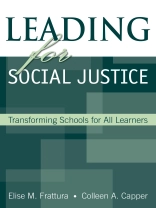‘An opportunity for aligning educational programming within schools to provide a comprehensive Pre K–12 experience with the results districts are looking for: students exceeding their potential and having the skills, knowledge, and long-term understandings that can be applied to real-world problems.’
—Brian T. Pulvino, Director of Special Education
Syracuse City School District, NY
‘A must-read for teachers, principals, directors, and superintendents as they advance equity and excellence for all children.’
—Barbara J. Sramek, Director of Special Education
Marshall Public Schools, WI
An insightful guide for integrating comprehensive services to benefit all students.
Acknowledging that student achievement increases in inclusive learning environments and decreases when groups are taught separately, this easily accessible guide examines methods for raising the achievement of English Language Learners and students with special needs, who are sometimes overlooked in a culture of high-stakes testing. The authors provide a step-by-step process for conducting a formative analysis to help schools integrate schoolwide change through proactive support services.
Readers will find ways to:
- Examine discrepancies between current practice and research
- Build a school climate that supports students with challenging behaviors
- Implement programs focused on continuous equity-driven accountability
- Develop curriculum, instruction, and teacher capacity
Ideal for special education teachers, directors of special education, and other district administrators, this excellent resource can help you develop an instructional climate to promote success for every student!
विषयसूची
Preface
Acknowledgments
Introduction
Cornerstone 1. Core Principles: Focusing on Equity
1. Integrated Comprehensive Services (ICS)
2. Leadership for ICS and Social Justice
3. Developing and Living a School/District Mission for ICS and Social Justice
4. Data for Consciousness, Decision Making, and Evaluation
Cornerstone 2. Establishing Equitable Structures: Location and Arrangement of Educational Services
5. Teams for Shared Decision-Making, Staff Design, and Student Support
6. Creating a School Climate That Supports Students With Challenging Behaviors
7. School Involvement With Families
Cornerstone 3. Providing Access to High-Quality Teaching and Learning: Building Teacher Capacity and Curriculum and Instruction
8. Teaching Within ICS and for Social Justice
9. Students Who Significantly Challenge Our Teaching
10. English Language Learners and ICS (co-written by Martin Scanlan)
11. Developing Teacher Capacity via Hiring, Evaluation, and Teacher Collaboration
Cornerstone 4. Implementing Change: Funding and Policy
12. Reallocating Resources for ICS and Social Justice
13. Developing School District Policy and Precedures to Leverage ICS and Social Justice
14. Using State and Federal Regulations to Leverage ICS and Social Justice
15. The Messiness of Change Toward ICS and Social Justice
References
Appendices
Index
लेखक के बारे में
Colleen A. Capper is professor in the Department of Educational Leadership and Policy Analysis at the University of Wisconsin-Madison. She has authored or coauthored five books (published or in-press) and refereed journal articles related to educational leadership and equity. Capper has served as a special education teacher, administrator of special programs, and founding director of a nonprofit agency for preschool children and adults with disabilities in the Appalachian region of Kentucky. Capper works with individuals in school districts, nonprofit, and for-profit agencies across the country on ways to integrate social justice, equity, and spirituality into their daily work.












